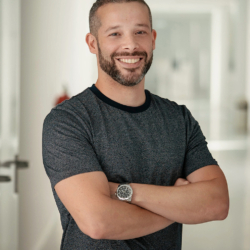Sobre mí
With a degree in Telecommunications Engineering from the University of Seville and a Ph.D. in Information and Communication Technologies from the University of Granada, I have a background in the private sector and a career focused on health research. Throughout my professional journey, I have specialized in studying neurodegenerative disorders such as Alzheimer’s and Parkinson’s. In collaboration with the Medical Oncology Service at the San Cecilio University Hospital in Granada, I have also developed methods that contribute to a deeper understanding of cancer. Currently, I am part of the ORACLE project team, an international initiative funded by the European Research Council (ERC) that employs artificial intelligence to predict cardiovascular risks, working closely with the Virgen de la Victoria University Hospital in Málaga and the University of Messina in Italy.
My commitment to public health research has been realized through various high-level international collaborations. One of the most notable milestones in my career is the development of the first AI model for hereditary Alzheimer’s analysis, achieved in collaboration with the University of Cambridge (United Kingdom), the University of Munich (Germany), and prestigious research centers like DZNE. This pioneering model has significantly contributed to understanding genetic profiles and heterogeneity in the presymptomatic stages of hereditary Alzheimer’s.
Since joining the University of Málaga in 2023, I have also advanced innovative methods for EEG signal analysis, aiming to gain a better understanding of cognitive mechanisms. This project is carried out in collaboration with international teams such as the Evolutionary Systems and Biomedical Engineering Lab (LaSEEB) at the Instituto Superior Técnico of the University of Lisbon, with whom I collaborate as an external researcher.
Edad
Correo electrónico
Perfil en ORCID
Área de trabajo
Grupo de investigación
Líneas de investigación
- Alpha-Stable distributions.
- Biomedical Signal Processing.
- Clinical Data Analysis.
- Data Modeling.
- Deep Learning.
- EEG.
- Ensemble Learning.
- Functional Connectivity.
- Machine Learning.
- Medical Oncology (Cancer Research).
- Neuroimaging.
- Neurosciences.
Proyectos de investigación
Ref.: ERC-101117469. Title: Optimize risk prediction after myocardial infarction through artificial intelligence and multidimensional evaluation (ORACLE).
- Ref.: PID2022-137461NB-C32. Title: Conectividad funcional, fusión de información e IA interpretable para el modelado de la sincronización neuronal en la dislexia mediante computación HPC y ENERG.
- Ref.: C-ING-183-UGR23. Title: Sistemas de Ayuda al Diagnóstico de la Enfermedad de Alzheimer Basados en el Cálculo de Isolíneas en Imágenes Cerebrales.
- Ref.: TED2021-132261B-I00. Title: Una plataforma de aprendizaje de la lectura basada en la ciencia de datos y la inteligencia computacional.
- Ref.: P20_00525. Title: Diagnóstico por Imagen de Síndromes Parkinsonianos basado en Aprendizaje Supervisado. Evaluación de la función pre/post sináptica mediante trazadores PET y SPECT.
- Ref.: RTI2018-098913-B-I00. Title: Neuroimagen profunda basada en aprendizaje máquina: Búsqueda de patrones anormales en autismo y en las enfermedades de Alzheimer y Parkinson.
- Ref.: CV20-45250. Title: Aprendizaje profundo máquina aplicado al análisis de imágenes multimodales para la evaluación del síndrome respiratorio agudo grave.
- Ref.: A-TIC-080-UGR18. Title: Aprendizajes Extremos en Neuroimagen: Aplicación a Modelos de Degeneración y Condición del Espectro Autista.
Ref.: TEC2015-64718-R. Title: Análisis multimodal y longitudinal de biomarcadores para el diagnóstico y la predicción de la enfermedad de Alzheimer y de Parkinson.
Resultados destacables
Pioneering predictive models for neurodegenerative diseases: My contributions to the DIAN initiative led to the development of the first predictive model for Dominantly Inherited Alzheimer’s Disease (DIAD) patients at presymptomatic stages. This work provided critical insights into the genetic heterogeneity of Alzheimer’s and has been published in collaboration with University of Cambridge (UK) and Ludwig Maximilian University of Munich (Germany).
- Innovative EEG-based methodologies: I have developed advanced models to enhance the detection of neural connectivity patterns, particularly in EEG cross-frequency couplings. These methodologies have applications in understanding cognitive processes and have supported joint publications and project proposals as an external collaborator with the LaSEEB (University of Lisbon, Portugal) research group.
Application of AI in personalized medicine: As part of the ERC-funded ORACLE project, I contributed to developing AI-driven models for cardiovascular risk prediction and personalized treatment. This initiative represents a major advancement in the integration of AI into public health.
Institución
Vocación
From an early stage in my academic journey, I was driven by a curiosity about the human brain's complexity and the potential of artificial intelligence to unravel its mysteries. During my doctoral studies, this curiosity evolved into a focused commitment to bridging clinical challenges with computational solutions. My vocation is rooted in the belief that advanced technologies, like AI and machine learning, can empower researchers and clinicians to address some of the most pressing issues in neuroscience and personalized medicine. This dedication is reflected in my contributions to predictive modeling in Alzheimer’s and Parkinson’s research and my ongoing work in EEG signal analysis and cardiovascular health. For me, science is not just a profession—it’s a calling to contribute meaningfully to society through innovation and collaboration.
Deseo científico
My scientific aspiration is to push the boundaries of how artificial intelligence and data modeling can be leveraged to personalize healthcare and uncover the underlying mechanisms of complex disorders. I aim to lead projects that integrate interdisciplinary perspectives, combining computational expertise with clinical insights to develop tools that directly improve patient outcomes. My ultimate goal is to create accessible, explainable, and impactful AI-driven systems that address the unmet needs of clinicians and researchers, advancing our understanding of neurodegenerative diseases, cognitive processes, and cardiovascular health. I envision a future where such tools not only enhance diagnostics but also enable early interventions and personalized treatments, fostering a more precise and equitable approach to medicine.



